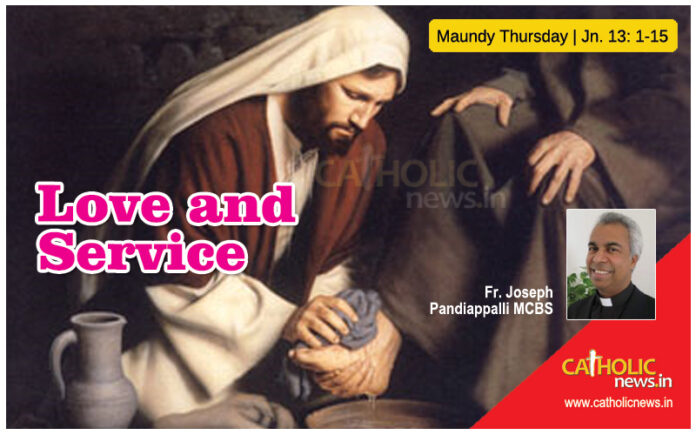
Today we begin the celebration of three holy days of Christ’s passion, death, and resurrection. After Jesus‘ journey on the back of a donkey on Palm Sunday, Jesus surprised his disciples again by washing their feet on Thursday. At that time it was a service done by slaves only. On Thursday Jesus gave his most important announcement and signs before his arrest and crucifixion. Today we thank him for his great acts of love for us humans. As disciples of Jesus, we want to experience his message of love through today’s liturgy. Today’s liturgy is very rich in themes, signs, and symbols if we consider all the suggestions and possibilities of liturgical celebration of this day.
The first reading reminds us of the first Passover meal of the Jews in Egypt and their liberation from slavery under the Egyptians. The second reading reminds us of the institution of the Eucharist as a sign of Jesus’ love and his presence among us. The Gospel tells of the washing of Jesus’ feet and the celebration of the Last Supper, which he also celebrated as the Jewish Passover meal.
The first Passover meal of the Jews was a meal of liberation from Egypt. It took place through their flight across the Red Sea into the desert to the Promised Land. The liberation following Jesus’ Last Supper came through the Passion, death, and resurrection of Jesus out of his love and God’s love for us humans. The annual Passover and the Passover meal of the Jews commemorate their liberation through the grace of God. Through the daily celebration of the Eucharist, we Christians experience Jesus’ Last Supper and the institution of the Eucharist.
When we understand the signs of the washing of the feet, experience the institution of the Eucharist, and believe in the presence of God in the Eucharist, then we experience how much God loves us. These signs of Jesus convince us how easily and simply we can experience and share divine and interpersonal love. Jesus’ act of serving through the washing of the feet and the fellowship of his disciples explicitly demonstrate that we can also experience divine and human love through simple means and simple signs. Helping or serving, shared meals, festivities, or invitations are means exemplified and suggested by Jesus to love God and humanity, as well as to experience divine and human love.
To experience God in our Christian religion, we don’t need to go to a mountain or to the desert. We only need to serve and help people, work together with those around us, and share a meal together. Jesus proclaims this simplicity of experiencing God through his words and deeds. The liberation that Jesus proclaims through such simple means is far deeper and more intense than the liberation of the Jews from slavery in Egypt. Jesus assures us of an inner, spiritual, personal, and interpersonal liberation. This liberation through service, through loving thought and action, and through sharing a meal together, is a liberation from selfishness, consumerism, hatred, exclusion, or exploitation. The Eucharistic communion reminds us of the importance of service, love and shared meals; it can give us new courage and strength every day to experience divine and human love.
Love and service also require sharing. That’s why the first Christian community placed such emphasis on sharing, which meant everyone could have enough, although they couldn’t maintain this exemplary community for long. But Christians have always sought to follow this example in order to spread the message of service, love, and sharing to all people in the world, and thus help all those suffering from poverty in terms of food, education, or human care. The world today suffers greatly from a lack of humanity, honesty, truthfulness, and loyalty. The celebration of Maundy Thursday can encourage us to recognize, practice, and proclaim the message of love and service.
Fr. Joseph Pandiappallil MCBS



